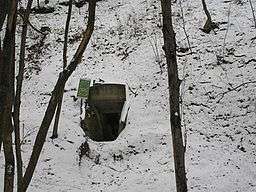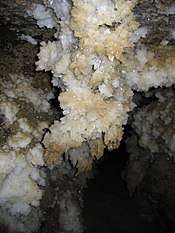Optymistychna Cave
Optymistychna (Ukrainian: Оптимістична: meaning "optimistic", also known as Peschtschera Optimistitscheskaya)[2][lower-alpha 1] is a gypsum cave located near the Ukrainian village of Korolivka, Borshchiv Raion, Ternopil Oblast.[3] Approximately 230 km (140 mi) of passageways have been mapped within.[1] As a result, it is the longest cave in Eurasia and the fifth-longest cave in the world,[4] after Mammoth Cave, Sistema Sac Actun, Jewel Cave and Sistema Ox Bel Ha. It is also the longest gypsum cave in the world.[1]
| Optymistychna | |
|---|---|
 | |
| Location | near Ukrainian village of Korolivka, Borschiv Raion, Ternopil Oblast |
| Coordinates | 48°44′33″N 25°59′37″E |
| Length | 230 km (140 mi)[1] |
| Discovery | 1966 |
| Geology | gypsum |
History
The cave complex was discovered by the speleologists of the Lviv speleological club "Cyclope" in 1966. It was entirely unknown before then.[5] There have been more than 50 expeditions since then, but exploration has slowed significantly in recent years, and very little surveying is currently being done.[3] The cave is located very close to the Priest's Grotto or Ozerna Cave, the eleventh-longest cave in the world at 130.4 km (81.0 mi), but the two caves have not yet been found to be connected.[1]
In 2008, the cave was recognized as a Natural Wonder of Ukraine.[6]
Geology

The entire cave lies under a 2 km square area in a layer of Neogene period gypsum that is less than 30 metres (98 ft) thick.[5][7] The passages tend to be fairly small, no more than 3 metres (10 ft) wide and 1.5 metres (5 ft) tall for most, although at intersections they can be up to 10 metres (33 ft) tall.[5] They are often choked with mud. They comprise a dense network on several levels, making Optymistychna known as a "maze cave".
Optymistychna's gypsum bed is topped with a limestone layer, which has seeped through into the cave via erosion and formed into calcite speleothems.[5] At other places, the gypsum has formed crystals, often tinted a multitude of colors by mineral salts. In some areas, large gypsum rosettes have formed, colored black by Manganese oxide.[5]
Notes
- This English transliteration was used during the Soviet era but is now deprecated.
References
- White, William Blaine; Culver, David C. (2012). Encyclopedia of Caves. Academic Press. p. 830. ISBN 9780123838322.
- Herb and Jan Conn (1977). The Jewel Cave Adventure: Fifty Miles of Discovery under South Dakota. p. 230. ISBN 0-914264-20-6.
- "Optimistic cave. Speleotourism. Active and extreme tourism. Travel". www.cave-ua.narod.ru. Retrieved 2017-06-28.
- "OPTYMISTYCHNA IS THE LONGEST CAVE IN UKRAINE - Information Portal Good News". ukrainegoodnews.com. Retrieved 2017-06-28.
- Scheffel, Richard L.; Wernet, Susan J., eds. (1980). Natural Wonders of the World. United States of America: Reader's Digest Association, Inc. pp. 282. ISBN 0-89577-087-3.
- Optimistic Caves Archived 2009-03-24 at the Wayback Machine
- Warren, John K. (2016-05-18). Evaporites: A Geological Compendium. Springer. p. 677. ISBN 9783319135120.
External links
| Wikimedia Commons has media related to Optymistychna Cave. |
- Official site of Optimistic cave
- Chapter II.9, Gypsum Karst in the Western Ukraine by Alexander Klimchouk article appearing in: International Journal of Speleology, vol. 25, #3-4, 1996, p. 263-278.